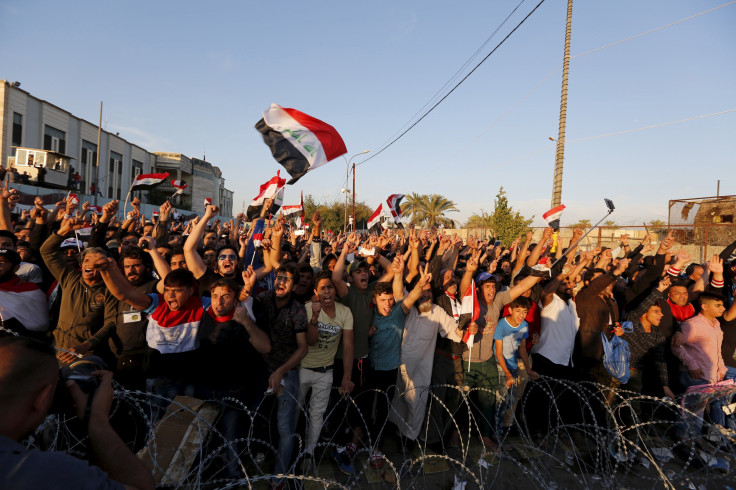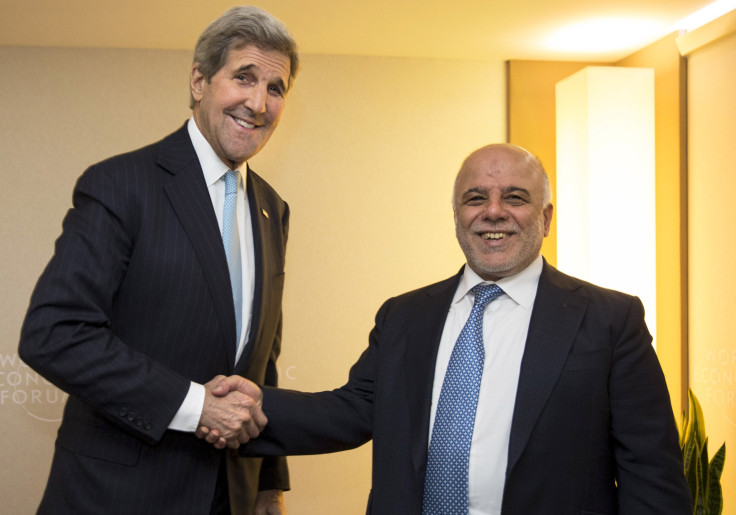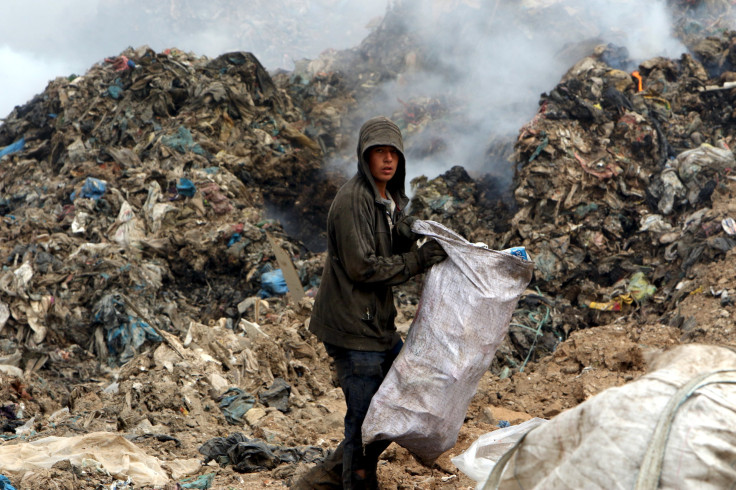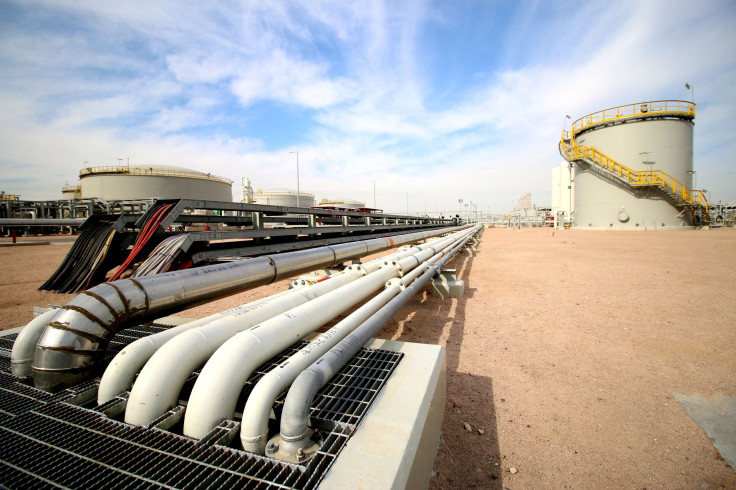US Aids Iraqi Army, But Sectarian Tensions Threaten Prime Minister Abadi’s Future

In the early morning hours at the side of the main highway in Erbil, capital of Iraqi Kurdistan, men squat, shading their eyes from the sun with their hands. They are looking for construction trucks that sometimes pick them up off the side of the road and hire them for the day. The pay is not much, but for many working-age men, sporadic day jobs are the only way they can afford to pay for dinner. Meanwhile, across town, government employees are working with no pay. They have not received salaries in six months.
“I only have 5,000 dinars ($4.50) until I get my next paycheck,” Mohammed Ali Asked, a 25-year-old arts teacher in Kirkuk, told International Business Times in January. “Lots of people have divorced because of not getting paid, and I am afraid my situation is going to be like that. The situation is not suitable for marriage here. I can’t afford a family. If a wife asks for something, I can’t pay for it.”
Iraq went from being touted by American officials as one of the richest oil-producing countries in the world to a land struggling to feed its people. The economy in Iraqi Kurdistan has declined rapidly in the past two years, and the downturn is also fueling the political upheaval in Baghdad, experts say.
"Baghdad is under enormous pressure from the war against the Islamic State, the fall in oil prices, Kurdistan's growing appetite for independence and Sunni discontent," said Daniel Serwer, an expert on Iraq at the Middle East Institute, a think tank in Washington.
The central government is teetering on the edge of collapse as Prime Minister Haider al-Abadi tries to stem corruption, starting with a drastic overhaul of his Cabinet. Some members of Parliament are protesting his efforts to appoint new leaders and are calling for his ouster, while others are pressuring him to press forward with his reform.
“Abadi’s inability to rule in a competent fashion is causing this," said James Jeffrey, a former U.S. ambassador to Iraq.
“The government is teetering, but there isn't much the U.S. can do about it,” said Jeffrey. The U.S. supported Abadi's rise to power and continues to advise the prime minister, but the system in place is based on policies advocated by American officials after President George W. Bush's invasion that failed to take into account fierce sectarian tensions.
The sectarian infighting and corruption in the Iraqi government has persisted for years, experts say, which is why the outcome for Abadi and the central government as a whole is so bleak.
In the early days of the Iraq War, the U.S. worked closely with energy companies to open a path for their participation in the production of oil and gas in previously untapped parts of Iraqi Kurdistan. The Americans pushed through a set of guidelines that pushed the country toward privatization and away from the existing nationalized system. That heightened the divisions between the separatist Kurds and the leadership in Baghdad. Everyone wanted a piece of the oil market.

The oil sector debacle followed the U.S.-ordered de-Baathification of the government following the 2003 overthrow of Saddam Hussein. As a result, many Sunni Arabs employed in the government were fired, and the military was disbanded by the Americans.
Iraq hobbled along for some time as leaders of the Shiite majority in Baghdad installed their fellow sectarians in top positions. The U.S. thought it could reverse its massive blunder by appointing and advising a new leader. But every leader since the fall of Saddam has failed to overcome the sectarian divides that were intensified during the invasion.
Although President Barack Obama ended the U.S. combat role and brought American troops home, he left Iraq to deal with a political system that was, analysts say, set up to fail. Each party in Parliament is itself mismanaged and appoints its leaders based on family affiliation or financial clout.
"Clearly any new minister would like to be sure that he or she will have the kind of political support required to get the job done," Serwer said.
The semi-democratic political system the U.S. installed in Iraq after the invasion failed to take into account the very real divisions among the ethnic and religious groups, Jeffrey said.
"This is happening because of Abadi's own inability to rule in a competent fashion. He is not good at the nuts and bolts of government," Jeffrey said. "The U.S. would rather have Abadi than chaos, but the problem is we are almost at the brink. People are now surrounding ministries. Abadi needs to get on top of this very quickly."

The U.S. supported the appointment of Abadi and the removal of its previous favorite, Prime Minister Nouri al-Maliki. Maliki's government was characterized by a hard-line stance against Sunni Muslims that divided the country even more and, in 2010, the U.S. looked around for another Iraqi to take office. Abadi seemed like a good bet. He was willing to try to bring the country together and include all ethnicities and religions in the government. He wanted to create a more stable economy that relied less on oil and more on other exports such as wheat. Now it seems the prime minister finds himself in the same position Maliki did a few years ago.
Today, Abadi is trying to rid the country of corruption by reshuffling top positions, but parties are taking advantage of that opening. Abadi's efforts have so far failed: Several of his nominees have refused to accept the jobs and, in the ensuing vacuum, officials are quietly trying to skew the economy for personal gain.
"I am looking forward to Parliament performing its legislative and supervisory role fully, and voting on the ministerial change in the coming days and as soon as possible,'' Abadi said in a statement on his website Monday.

Muqtada al-Sadr, a powerful Shiite cleric who used to support Abadi, is now threatening to uproot the government altogether. In a handwritten letter published on social media, he called on the government to form a new Cabinet and warned that if it did not move forward with negotiations, it could break down altogether.
“The current political crisis threatens the stability of Iraq in an unprecedented manner, and the crisis could see the government collapse,” the Institute for the Study of War reported in a recent assessment of Iraq.
The Islamic State group is trying to retake the oil fields it lost two years ago in Iraqi Kurdistan by launching rockets at Kurdish and Iraqi soldiers. In an attempt to regain the massive profits it previously funneled into funding international terrorism, the group has focused its resources on attacking Makhmur. So far, the group has succeeded in outgunning the Iraqi forces in the city, but a new contingent of American Marines could change the outcome on the ground.

The U.S. troops on the front line are tasked with protecting Iraqi units in Makhmur. Tens of thousands of people have been displaced because of the fighting in Makhmur and in Anbar province. Humanitarian organizations say at least 38,000 have been displaced from the city of Hit in Anbar since March.
Despite the intervention on the ground, the U.S. is unable to wield political influence in Baghdad. As protests continue to take place in the Green Zone, Abadi's future will remain uncertain.
"There is an Iraqi political dynamic over which Washington has little real influence," Serwer said. "Not everything in Iraq is a consequence of what the U.S. does."
© Copyright IBTimes 2024. All rights reserved.











